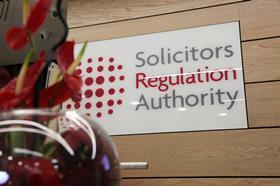A senior family lawyer has avoided a fine or suspension despite admitting to backdating a joint venture agreement for her client. Jacqueline Major, a partner at London firm Hodge Jones & Allen, had backdated the loan document at her client’s request and it later became relevant when the client divorced and was involved in financial remedy proceedings.

Major had been advised by leading counsel that she did not need to disclose the backdating to court because it was intended to accurately reflect the truth of when the loan was arranged.
She accepted she had made an ‘error of judgment’ but with no intention to deceive or mislead. The Solicitors Regulation Authority accepted this and decided to rebuke her with no further action required.
The regulator said that Major, admitted in 1996 and dual-qualified as a barrister, had been instructed in 2015 to help sort out the financial aspects of a divorce. Her client was a property developer who had been provided with a £9.1m investment in 2011 through joint venture arrangements with his sister-in-law.
Prior to acting in any matrimonial proceedings, Major instructed counsel to document the joint venture and she backdated the draft documents from 2015 to 2011.
When the wife issued financial proceedings in 2016, Major accepted counsel’s advice about not disclosing the backdating. The same leading counsel represented the client at the financial remedy hearing and at no point was it explained that documents had been backdated.
It was only when the client instructed different solicitors that he disclosed the backdating to his wife’s lawyers. A report was also made to the SRA.
Major explained that when the documents were created, financial remedy proceedings were not expected and she did not know the client would ever rely on them in court.
The backdated documents were always intended to reflect the true position which her client and his sister-in-law had attempted to document previously in 2011. They were never intended to be misleading and in fact did not mislead the wife, who was aware of these arrangements.
In terms of disclosure, she had relied on the advice of leading counsel (not named by the SRA), who was subsequently investigated and prosecuted by the Bar Standards Board and acquitted of allegations of misleading the court.
The SRA accepted that Major had made an error of judgment, she was remorseful, the case had caused her stress and anxiety and there was no dishonesty or lack of integrity on her part. She accepted full responsibility, cooperated at all times with the investigation and had no previous adverse regulatory history.
A rebuke was deemed sufficient to reflect this mitigation but also to make some public sanction. Major must also pay £1,350 costs.


























